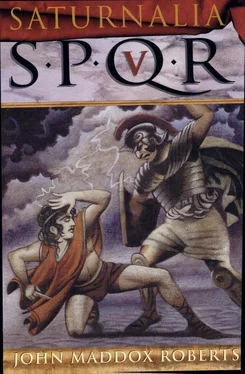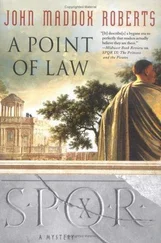John Roberts - Saturnalia
Здесь есть возможность читать онлайн «John Roberts - Saturnalia» весь текст электронной книги совершенно бесплатно (целиком полную версию без сокращений). В некоторых случаях можно слушать аудио, скачать через торрент в формате fb2 и присутствует краткое содержание. Год выпуска: 0101, ISBN: 0101, Издательство: St. Martin, Жанр: Исторический детектив, на английском языке. Описание произведения, (предисловие) а так же отзывы посетителей доступны на портале библиотеки ЛибКат.
- Название:Saturnalia
- Автор:
- Издательство:St. Martin
- Жанр:
- Год:0101
- ISBN:9780312320188
- Рейтинг книги:4 / 5. Голосов: 1
-
Избранное:Добавить в избранное
- Отзывы:
-
Ваша оценка:
- 80
- 1
- 2
- 3
- 4
- 5
Saturnalia: краткое содержание, описание и аннотация
Предлагаем к чтению аннотацию, описание, краткое содержание или предисловие (зависит от того, что написал сам автор книги «Saturnalia»). Если вы не нашли необходимую информацию о книге — напишите в комментариях, мы постараемся отыскать её.
Saturnalia — читать онлайн бесплатно полную книгу (весь текст) целиком
Ниже представлен текст книги, разбитый по страницам. Система сохранения места последней прочитанной страницы, позволяет с удобством читать онлайн бесплатно книгу «Saturnalia», без необходимости каждый раз заново искать на чём Вы остановились. Поставьте закладку, и сможете в любой момент перейти на страницу, на которой закончили чтение.
Интервал:
Закладка:
I all but let my cup clatter to the floor. “Jove preserve us! You mean the Germans are across the Rhine again?”
“So it would seem. Only mercenaries so far, but they have a new and apparently ambitious king, one Ariovistus. Last I heard, the king was still east of the Rhine; but my sources say that there may be more than a hundred thousand German warriors on the western bank already, and the Germans have coveted the rich lands of Gaul for a long, long time.”
I groaned. As a rule, foreigners come in three sorts. There are the comical ones, like Egyptians and Syrians. Then there are the ones who are both comical and scary, like the Gauls. And then there are the Germans, who are just plain terrifying.
“Surely the Senate isn’t sending Caesar into Gaul with a mandate to drive the Germans out?”
“By no means. I suspect that Caesar will first ensure that the Helvetii do not migrate into Roman territory. That is what has been feared for years. He cannot very well march to the Rhine and leave them at his back. I think he intends to crush the Helvetii, then wheel northeast and take on the Germans and their Gallic allies.” He gave me a self-deprecating smile. “Of course, that is just my theory. I am not a military man.”
Lisas dealt with the world from his embassy, but he knew how to interpret a map and he had a sound grasp of politics as it is played on a world scale. I did not doubt that he was very close to the truth of the situation. Roman territory did not extend to the Rhine, but for generations we had considered it our unofficial border. If the Germans crossed, it was a sign of hostility.
“Nobody ever gained great wealth fighting Germans,” I said. “Gauls are a wealthy people by comparison.”
“But one may win glory and a triumph,” Lisas pointed out. “And who was the last Roman to defeat the Germans?”
“Marius, of course,” I said. “At Aquae Sextiae and Vercellae.”
“And what is Caesar’s dearest wish except to be the new Marius? He has courted the populares for his whole career, always stressing that Marius was his uncle by marriage.”
“It makes sense,” I admitted. “But it amazes me that even a man like Caesar can believe that he has what it takes to beat the Germans! A few victories in Spain don’t amount to all that much. By the time Marius fought those battles, he’d all but built his legions from scratch and led them to victory for twenty years. You can’t just take charge of established legions as a new proconsul and expect that sort of performance and loyalty.” I knew as I said it that I was probably wrong. Everyone, myself included, had underestimated Caesar for years.
“Caesar has a genius for persuading the common people. Men don’t come any more common that legionaries. They are the most powerful force in the world, more powerful than politicians and consuls, more powerful than the Senate. Marius knew that and so did Sulla. Pompey never understood it, and so his sun is setting.”
As I took my leave of him, Lisas led me out by the arm. “Decius, my friend, as always I rejoice to see you, but I did not expect to see you until after the tribuneship of Clodius should expire at the end of next year.” He had given me some inside information, now he expected the favor to be returned.
“I must confess that I am surprised as well. I was recalled from Rhodes unexpectedly. It has something to do with Celer’s death.”
His eyes lit up with conspiratorial delight. “A most distinguished man. We were stricken with grief at his untimely passing. Your family expects you to exercise your … unique talents in the matter.”
“I can’t imagine why else they want me here. I’m not a family favorite.”
“But you have a brilliant future before you,” he effused. “I am sure that, in a decade or two, you shall be the most prominent of all the Metelli. You must come see me often while you are in Rome. I may be able to help you. I hear things.” And, of course, he wanted me to pass on anything I might learn. It might be a fair trade.
I had little confidence in his predictions about my bright future. At that time the only way to achieve prominence in Roman life was through military glory or extreme longevity (Cicero, as always, was the exception). I detested military life and my prospects of reaching my fortieth year were exceedingly slim. Oddly, I actually have reached the distinction Lisas predicted so many years ago, although in a way neither of us could have dreamed. I am the only Caecilian of my generation still alive.
But he was wrong about Caesar. Caesar wasn’t interested in being the new Marius; he wanted to be the one and only Julius Caesar.
3
The meeting was held in my father’s house. The janitor opened the door when Hermes knocked and we went inside. The old mansion was eerily quiet.
“The Master and the others are in the triclinium,” the aged gatekeeper informed me. “Your boy will have to stay in the back of the house with the other slaves.” That explained the quiet.
Hermes made a face. “I’ll just wait out front, in the street.”
“You mean in that tavern on the corner,” I said. “Get on in back.” He stalked off with ill grace. I could sympathize. The real reason he didn’t want to be exiled to the rear was that my father had no young, pretty slave girls in his town house.
Besides my father, there were three Caecilians gathered in the triclinium, all of them named Quintus, my family not being imaginative in the way of names: Creticus, with whom I had served in foreign lands several times, and now the most prominent of the clan, a former consul and a pontifex; Nepos, who had been praetor the previous year, and an adoptive Caecilian who went by the ringing name of Quintus Caecilius Metellus Pius Scipio Nasica, was a pontifex and was serving as Tribune of the People that year. The rest of the distinguished men of the clan were away from Italy that year.
We exchanged curt greetings. The usual wine and refreshments were absent. There was not so much as a pitcher of water in the room. These men were here for serious business.
“I’m surprised to see you still in Rome, Nepos,” I said. “I thought you were given Sardinia.”
“I passed on it,” he said. “Vettius took it instead.” Nepos was a tall, soldierly man, who alone among our clan leaders supported Pompey. This was tolerated because that way, should Pompey become dictator, at least one of us wouldn’t be executed or exiled, and the family would keep most of its lands.
“I can sympathize,” I told him. “I wouldn’t accept Sardinia if I won it at dice.”
Creticus made a face. “You’ve not changed, Decius. You’re an utter political moron. Nepos stays in Rome because he’s going to stand for consul next year.”
“That explains a lot,” I said. “A proconsular province beats Sardinia any day. What’s up for grabs?”
“Barring a foreign emergency, he’ll be assigned Nearer Spain,” Father said. Nobody suggested that Nepos might be defeated or that, barring emergency, he would fail to secure the desired province. When the Caecilia Metella settled on one of their own for consul, he got it. And Spain had been Metellan territory for almost two hundred years. We had been governing there for so long that it was a major power base, second only to our Italian lands.
“Next year will be a bad one,” Creticus pointed out. “It will be Clodius against Cicero, and a tribune can do real damage. We’ll need to have as much influence as possible the year after to undo whatever’s been done. Scipio will stand for curule aedile as well.”
Scipio nodded. He was a pale, distinguished man of about thirty-five. “As aedile I will be celebrating my father’s funeral games. I intend to give a gladiatorial display of special magnificence.” His adoptive father, the elder Metellus Pius, had died four years earlier. It had become customary to delay funeral games until an heir held the aedileship, in charge of the public spectacles. That way he could discharge his civil and filial duties at the same time and win popularity for higher election. When Caesar was aedile he set incredibly high standards of spectacle outlay.
Читать дальшеИнтервал:
Закладка:
Похожие книги на «Saturnalia»
Представляем Вашему вниманию похожие книги на «Saturnalia» списком для выбора. Мы отобрали схожую по названию и смыслу литературу в надежде предоставить читателям больше вариантов отыскать новые, интересные, ещё непрочитанные произведения.
Обсуждение, отзывы о книге «Saturnalia» и просто собственные мнения читателей. Оставьте ваши комментарии, напишите, что Вы думаете о произведении, его смысле или главных героях. Укажите что конкретно понравилось, а что нет, и почему Вы так считаете.









